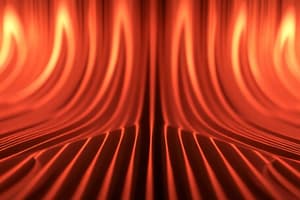Podcast
Questions and Answers
What did Christian Huygens propose in 1678?
What did Christian Huygens propose in 1678?
- Light produces longitudinal disturbance in the medium
- Light produces particles that travel in the form of a wave
- Light produces interference patterns
- Light produces periodic disturbance in the medium which travels in the form of a wave (correct)
How is interference of light defined?
How is interference of light defined?
- The bending of light waves around obstacles
- The reflection of light waves from a surface
- Redistribution of intensities when coherent light waves superpose (correct)
- The polarization of light waves
What is the result of constructive interference?
What is the result of constructive interference?
- Minimum amplitude and intensity of resultant light wave
- Maximum amplitude and intensity of resultant light wave (correct)
- Complete cancellation of light waves
- No change in the amplitude and intensity of light waves
What is the result of destructive interference?
What is the result of destructive interference?
What did Christian Huygens assume about the nature of light waves?
What did Christian Huygens assume about the nature of light waves?
Flashcards are hidden until you start studying
Study Notes
Christian Huygens' Proposals
- In 1678, Christian Huygens proposed that light is a wave, and he was the first to suggest that light waves are propagated in a medium called the ether.
Interference of Light
- Interference of light is defined as the superposition of two or more light waves, resulting in a new wave pattern.
Types of Interference
-
Constructive Interference
- The result of constructive interference is a brighter region, where the amplitude of the light wave is increased.
- Occurs when the crests of the light waves align.
-
Destructive Interference
- The result of destructive interference is a darker region, where the amplitude of the light wave is decreased.
- Occurs when the troughs of the light waves align.
Huygens' Assumptions
- Christian Huygens assumed that light waves are similar to water waves, requiring a medium (the ether) to propagate.
Studying That Suits You
Use AI to generate personalized quizzes and flashcards to suit your learning preferences.




